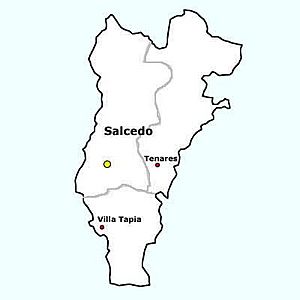Hermanas Mirabal Province facts for kids
Quick facts for kids Hermanas Mirabal |
||
| Province | ||
|
||
| Country | ||
|---|---|---|
| Development region | Cibao Nordeste (III) | |
| Capital | Salcedo | |
| - elevation | 196 m (643 ft) | |
| - coordinates | 19°25′12″N 70°23′24″W / 19.42000°N 70.39000°W | |
| Area | 427.4 km² (165 sq mi) | |
| Population | 121,887 (2014) | |
| Density | 285 /km² (738 /sq mi) | |
| Province since | 1952 | |
| Subdivisions | 3 municipalities 2 municipal districts |
|
| Congresspersons | 1 Senator 2 Deputies |
|
| Timezone | EST (UTC-4) | |
| Area code | 1-809 1-829 1-849 | |
| ISO 3166-2 | DO-19 | |
The Hermanas Mirabal province, once called Salcedo province, is a region in the north-central part of the Dominican Republic. Its main city and capital is Salcedo.
It became a province in 1952, originally named Salcedo. Later, in November 2007, its name was changed to Hermanas Mirabal. Before becoming a province, it was a smaller area within the Espaillat province.
Contents
Where is Hermanas Mirabal?
The Hermanas Mirabal province is surrounded by other provinces. To the north and west, it borders the Espaillat province. To the east, you'll find the Duarte province. To the south, it borders the La Vega province.
 |
Espaillat |  |
||
| Espaillat | Duarte | |||
| La Vega |
Why the Name Hermanas Mirabal?
The name Hermanas Mirabal means "Mirabal Sisters." These were three sisters named Patria, Minerva, and María Teresa Mirabal. They lived in a small town called Ojo de Agua in this province.
Sadly, they were killed on November 25, 1960, by people working for the dictator Rafael Trujillo. This day, November 25, is now known around the world as the International Day for the Elimination of Violence Against Women.
A Look at History
The province was first created in 1952. It was called Salcedo province back then. It included the areas of Salcedo and Tenares, which used to be part of the Espaillat province. Salcedo was chosen as the capital city.
In 1959, Villa Tapia became a municipal district within the province. Later, in 1968, it became a full municipality. Blanco became a municipal district in 1968, and Jamao Afuera followed in 2003.
How Many People Live Here?
In 2014, the last time a national count was done, there were about 121,887 people living in Hermanas Mirabal province. About 26,649 of them lived in towns and cities.
This province has a high population density, meaning many people live in a small area. It's one of the most crowded provinces in the country.
The province's population is about 1.29% of the total population of the Dominican Republic. It ranks as the 24th most populated province out of 31.
As of As of 2016[update], it's estimated that about 92,353 people live in the province. The largest city is Salcedo, the capital, with about 35,306 residents in 2014.
Geography of Hermanas Mirabal
The Hermanas Mirabal province covers an area of about 427.4 km2 (165.0 sq mi). This makes it one of the smallest provinces in the Dominican Republic. Only the Distrito Nacional is smaller.
The province has two main geographic areas. The northern part is in the southern area of the Cordillera Septentrional, which is a mountain range. The mountains here are not very tall. The southern part of the province is in the Cibao valley.
Salcedo, the capital city, is about 196 m (643 ft) above sea level.
There's a special protected area called the Reserva Científica La Salcedoa (Scientific Reserve La Salcedoa). It was created to protect a unique plant called the Salcedoa mirabaliarum, which only grows here. This area has interesting karstic landscapes, which are formed by dissolving rocks.
Climate
The climate in the province is tropical. This means it's warm or hot for most of the year.
Cities and Towns
The Hermanas Mirabal province has 3 main municipalities and 2 smaller areas called municipal districts (M.D.). Here are the main areas:
| Municipality (code) |
Municipal Districts (code) | Population (2010) |
Area (km2) |
Density | Altitude (m) |
|---|---|---|---|---|---|
| Salcedo (190101) | 35,306 | 84.2 | 419.3 | 196 | |
| Jamao Afuera (190102) | 4,251 | 92.8 | 45.8 | 700 | |
| Salcedo (190100) | 39,557 | 177.1 | 223.4 | ||
| Tenares (190201) | 22,922 | 92.7 | 247.3 | 163 | |
| Blanco (190202) | 4,843 | 66.2 | 73.2 | 183 | |
| Tenares (190200)) | 27,765 | 158.9 | 174.7 | ||
| Villa Tapia (190301) | 24,871 | 91.4 | 272.1 | 107 | |
| Villa Tapia (190300) | 24,871 | 91.4 | 272.1 | ||
| Hermanas Mirabal province (190000) | 92,193 | 427.4 | 215.7 | ||
What People Do for a Living
The main way people earn money in Hermanas Mirabal province is through agriculture. The most important crops grown here are plantains, cassava, coffee, and cacao (which is used to make chocolate!).
Related Topics
Images for kids
See also
 In Spanish: Provincia de Hermanas Mirabal para niños
In Spanish: Provincia de Hermanas Mirabal para niños
 | Percy Lavon Julian |
 | Katherine Johnson |
 | George Washington Carver |
 | Annie Easley |





